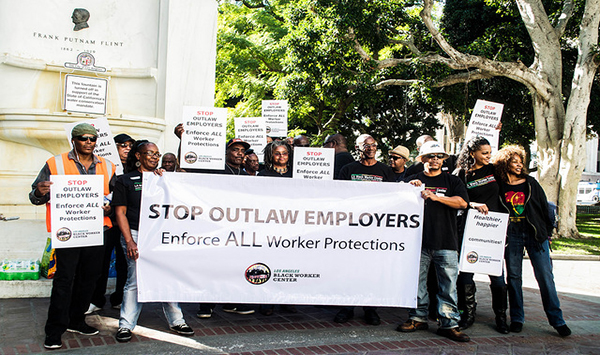Labor Bills Recently Enacted by Governor

Governor Jerry Brown had an October 15th deadline to sign or veto any bills passed by the legislature this past session. Among the bills chaptered, the following pertain to labor and employment:
SB 396 Employment: Gender Identity, Gender Expression, and Sexual Orientation
Under current law, California’s Fair Employment and Housing Act requires employers with 50 or more employees to train and educate its supervisory employees on the topics of sexual harassment within 6 months of their assumption to a supervisory position. Under AB 396, employers must include as part of that program, training inclusive of harassment based on gender identity, expression, and sexual orientation. It would require employers to post a poster developed by the Department of Fair Employment and Housing regarding transgender rights in a prominent and accessible location in the workplace. Currently, the California Workforce Innovation and Opportunity Act makes programs and services for individuals with employment barriers. With the implementation of SB 396, the definition of “individuals with employment barriers” will come to include transgender and non conforming individuals.
SB 295 Farm Labor Contractors: Sexual Harassment Prevention
This bill requires that farm labor contractors provide mandatory sexual harassment training to agricultural employees in the language that the employees understand. This will be done by providing training in that language or having an interpreter for the duration of the training. SB 295 will create statutes imposing liabilities on farm labor contractors for the following: not complying with training requirements, not providing employees a record of their training or a copy of the state’s sexual harassment pamphlet, falsifying employee training completion records, or not keeping training records.
SB 306 Retaliation Actions: Complaints: Administrative Review
This bill provides a revision of the existing retaliation claim procedures. It grants workers injunctive relief when they are retaliated against for complaining about wage theft, health and safety hazards, or other employment conditions. When there is reason to believe unlawful retaliation is taking place but the investigation is not yet complete, SB 306 gives the Labor Commissioner authority to go to court to obtain a temporary injunction, which can include an order that the employer reinstate the affected worker while the claims are investigated. The bill also expands the Commissioner’s authority to investigate retaliation cases with or without a complaint and increases penalties for employers who break the law. In addition, it grants the commissioner the authority to issue citations and penalties to employers for unlawful retaliation directly in order to enforce claims, rather than through the courts.
AB 1701 Labor-Related Liabilities: Original Contractor
Under AB 1701, for construction contracts entered into or after January 1, 2018, direct contractors are responsible for the following: unpaid wages, benefits, or contributions a subcontractor owes for labor connected to the contract. In addition, it requires subcontractors to provide the required payroll records at the direct contractor’s request. Failure to comply puts the direct contractor in a position to withhold the disputed sums.
SB 285 Public Employers: Union Organizing
Under SB 285, public employers are prohibited from discouraging or deterring public employees from becoming members of an employee organization or remaining in an employee organization. Employers are defined as the following including others not listed: counties, cities, districts, the state, schools, transit districts, the University of California, and the California State University. In order to enforce SB 285, the Public Employment Relations Board will be granted jurisdiction over violations of its provisions.
AB 168 Employers: Salary Information
AB 168 will limit an employer’s ability to ask about or rely on an applicant’s salary history when making employment decisions. In order to prevent companies from basing salary on past pay, AB 168 prohibits employers from requesting an applicant’s pay history. Employers will be required to set pay scale for positions and to provide this information to their applicants. When making a hiring decision, employers are prohibited from taking the applicant’s salary history into consideration. In addition to pay scale for positions, employers are required to publish.
SB 63: Unlawful Employment Practice: Parental Leave
Referred to as the “New Parent Leave Act,” it would be added to the California Family Rights Act (CFRA). The bill would expand parental leave to small businesses and its implementation would extend the CFRA’s protections to employers with 20 to 49 employees. Employers in small businesses would be required to provide a three month, job protected leave to new parents. In addition, it would prohibit employers from refusing to provide coverage under a group health plan for an employee who takes parental leave. This bill intends to allow parents, who work for small companies, to spend more time with their newborns.
AB 1008: Employment Discrimination: Conviction History
Referred to as the “Ban the Box Bill,” this bill would amend the Fair Employment and Housing Act (FEHA) to prohibit employers with five or more employees from asking questions about prior convictions to prospective job applicants before a conditional employment offer is made to the employee. Employers who deny employment on the basis of an applicant’s conviction history will be required to conduct an individualized assessment as to how the conviction history would impact job duties, and why it justifies denying employment. The following considerations would be included in the assessment: the gravity of the offense, the amount of time passed since the event occurred, and the nature of the job the applicant is seeking.
AB 450: Employment Regulation: Immigration Worksite Enforcement Actions
Referred to as the “Immigrant Worker Protection Act,” this bill focuses on the privacy and well-being of immigrant workers. This bill will indicate that unless a federal warrant is provided, employers can’t voluntarily provide immigration enforcement agents entrance to nonpublic areas in a workplace. The state labor commissioner or the attorney general will be granted the authority to enforce these new provisions.
To read the full text of these bills, visit: https://leginfo.legislature.ca.gov.


